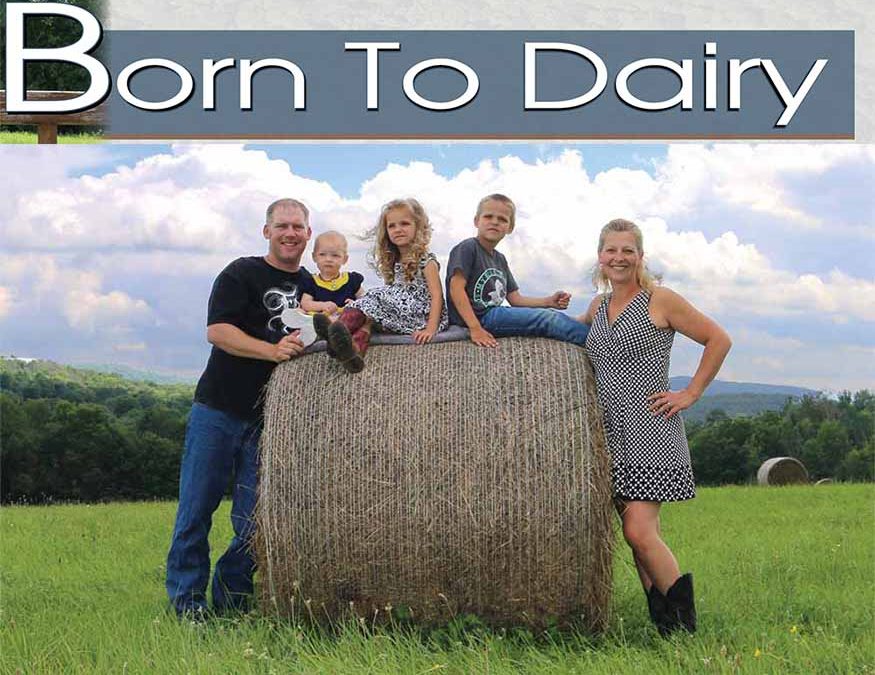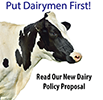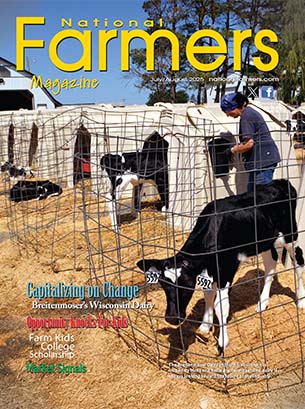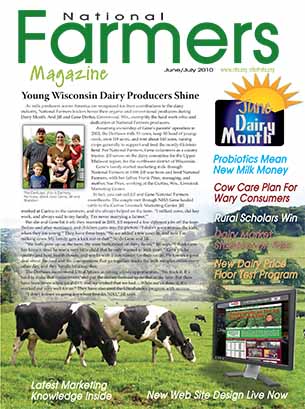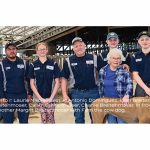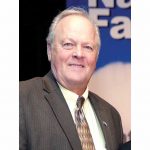Dairy farming is about more than cows. Some families are just born to be dairy farmers.
A few minutes visiting with Mike and Missy Cottrell will convince you that dairy farming seeps into your soul. The Cottrells live in Thompson, Pennsylvania, with their three children, Xander, six, M.J., four, and Morgan, one, on the dairy farm that has been in Mike’s family since 1947.
The dairy had been a constant in their family for 74 years, passed from his grandfather to his uncle and father, before Mike joined his dad. But, amid the pandemic, tragedy would shake that legacy.
The dairy and cattle have been integral to Mike’s life. “I grew up working alongside family milking twice daily and caring for the cows,” said Mike. “Dad and I milked together every day since 2013. We would be up at 1:45 a.m., milk 70 Holsteins, and then I went to work. Dad would handle the afternoon milking by himself, and after work, I would help with chores. Mom has always taken care of the farm accounts,” he said.
Life on the farm changed drastically for the Cottrells when Mike’s dad, Emerson, contracted COVID-19 and passed away in 2020.
After continuing to milk long before the sun thought of rising and in the early afternoon for a year, the family made the tough decision to sell the milk cows. “While everyone pitched in to help milk, my sisters and Missy, we knew the dairy wasn’t sustainable with everyone’s schedule and family commitments,” Mike said. Not wanting to be without cattle, they kept the heifer calves. “You don’t realize how much you enjoy going to the barn or seeing the cows in the pasture until they are not there,” Missy said.
Mike and Missy felt like a part of their heart left with the last cow stepping onto the trailer. “The cows were part of the family. I missed the interactions with them, petting them, scratching their favorite places, and talking to them,” Missy emphasized. After the cows left, you might think it was a relief not to work two jobs and have more time for other things, including a good night’s rest. But that was not the case. Mike was restless and had trouble sleeping. “It was depressing walking through the empty barn, not hearing the cows, not seeing them grazing,” Mike said.
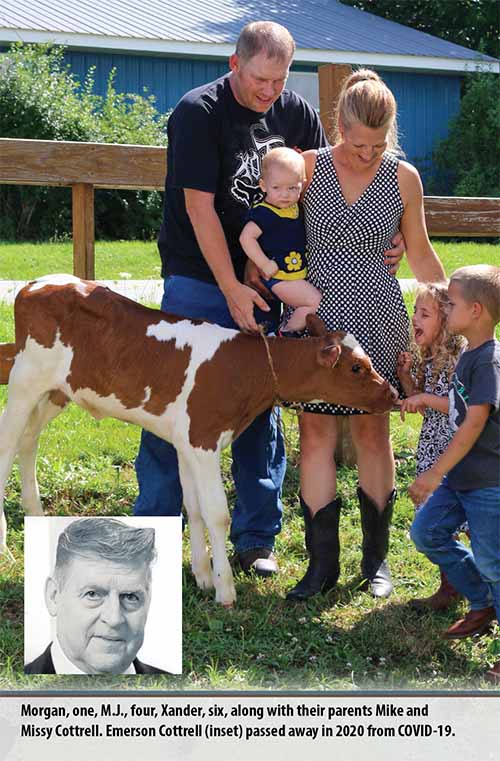
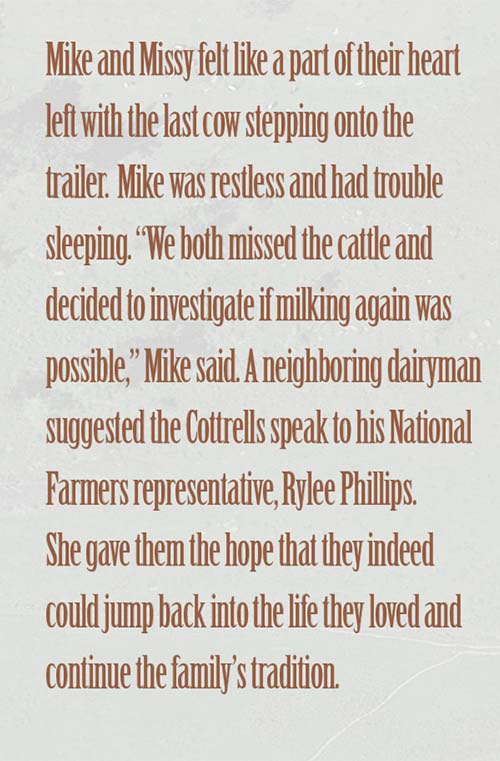
“I asked Mike, ‘When are you buying more cows’?” Missy said. They both missed the cattle and decided to investigate if milking again was possible. Having kept all the equipment and retained their genetics in the heifers, the Cottrells had a shot at successfully stepping back into dairying.
Interestingly, Reddington went out of business in December of 2021. So with that door forever shut, the Cottrells had to find a new outlet for the milk and a pickup schedule that would accommodate Mike’s work schedule if they were going to milk again successfully.
A neighboring dairyman suggested the Cottrells speak to his National Farmers representative, Rylee Phillips. Speaking with Phillips gave the Cottrells hope that they indeed could jump back into the life they loved and continue the family’s tradition. After Phillips inspected the operation, she gave the family the green light to look for some producing Holsteins and get the dairy up and running.
Cleaning, checking equipment, adjusting work schedules, and purchasing 25 cows, the Cottrells were back in the family business with one significant adjustment. “Making the upgrade to an auto take off milker, I don’t get hit in the face with tails quite so much,” Missy said, laughing. Using the income from the cows that were sold to purchase the new stock enabled the dairy to begin again, debt free.
The 64-head tie stall barn once again is bustling with life and laughter. The cattle are milked at 4 a.m. and 4 p.m., enabling Mike to be at both milkings. Missy and the children help in the afternoons. “The kids are on their pedal tractors pushing shavings around. Morgan is in her car seat smiling and chatting with the cows,” Missy said. All the activity with the kids in the barn while milking leads to tame, unflappable cows.
Having kids around the cattle not only produces easy-going cows that take everything in stride, but the cattle also impact the children. “Having chores, animals they are responsible for, and working around animals teaches the kids responsibility and respect,” Missy said. Being around the calves, the kids sometimes learn lessons the hard way, but they also remember those lessons. Outside every afternoon, in the barn helping with chores, or simply running down the haycart, the kids are experiencing life, not sitting in front of screens.
The family dairy continues to run much as it had in the past. The cows are fed cornmeal to keep them at an optimal weight, along with pelleted grain. Free access to minerals and silage bales in a hay cart enable one person to feed round bales. The cows have access to pasture as much as possible, providing exercise and sunshine. Cows are bred on pasture naturally, and heifer calves are kept for replacements to retain the genetics that have worked for the Cottrells for a quarter of a century. Bull calves are sold at local sale barns when they are a week old, reducing some of the workload.
“We were one of the fortunate families,” noted Mike. “We experienced what life was like without the dairy.” That experience cemented the Cottrell’s love of dairy farming and belief that there is no better way to raise their children. “I was disappointed in myself for selling the cows, but we learned a lot during the time without the cows,” Mike emphasized.
Almost a year to the day the cows left, the Cottrells were milking again. “National Farmers and Rylee have been great to work with. I am proud that we are milking, and the barn and pasture are again full of cows,” Mike says.
It takes more than the love for cows to make the hard work of dairy farming worthwhile. Commitment, love, and laughter are also needed. The Cottrell’s pasture will remain dotted with black and white cattle, and the barn will be full of life and children. Life comes with roadblocks and heartache, but following your passion helps us all realize that getting swatted in the face with a few tails makes us stronger.
“Dad would be proud of us,” Mike said.



